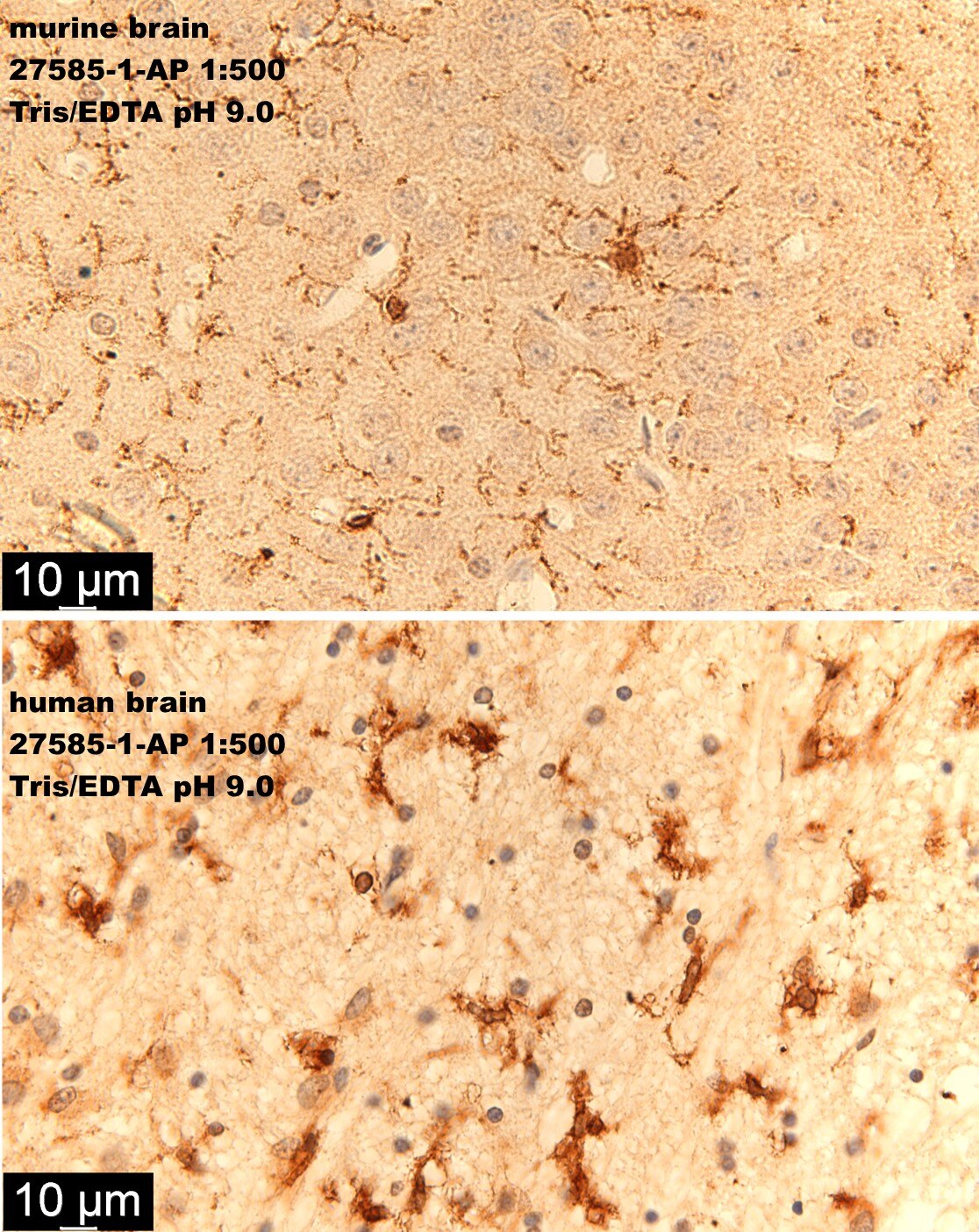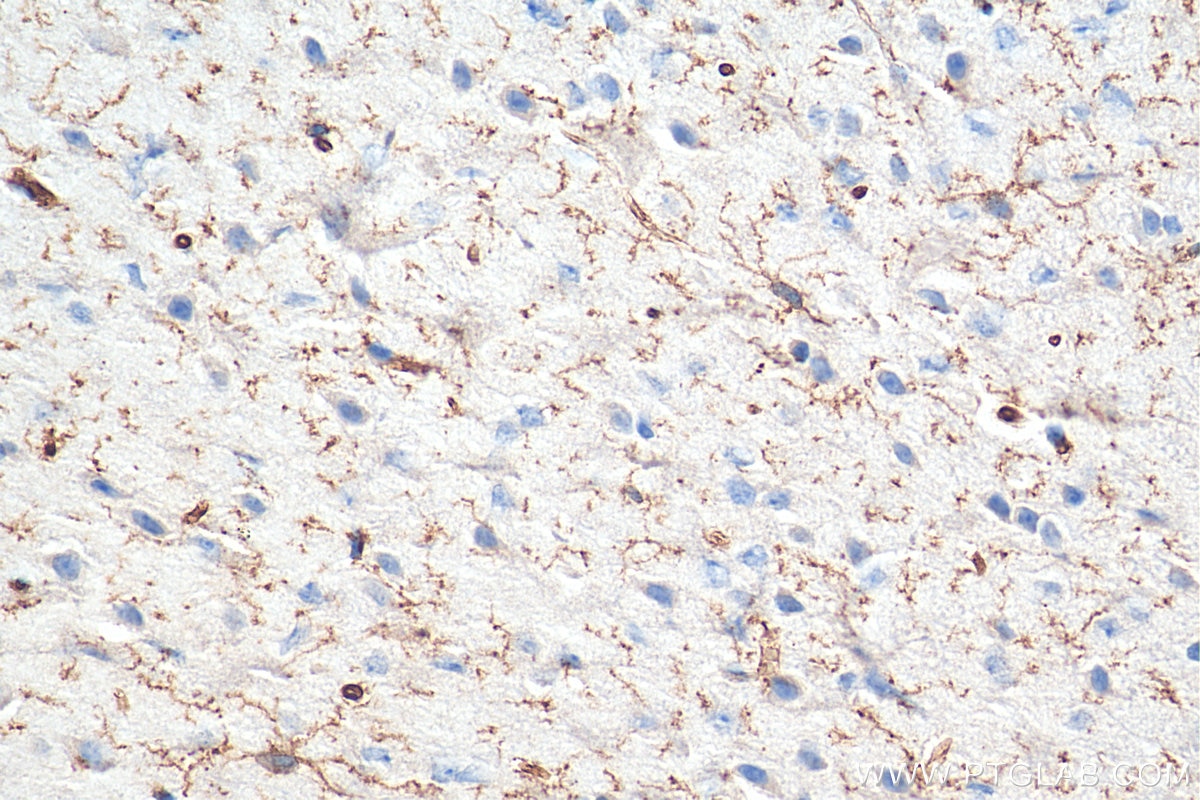TMEM119 Polyklonaler Antikörper
TMEM119 Polyklonal Antikörper für IHC, ELISA
Wirt / Isotyp
Kaninchen / IgG
Getestete Reaktivität
human, Maus
Anwendung
WB, IHC, IF, FC, ELISA
Konjugation
Unkonjugiert
Kat-Nr. : 27585-1-AP
Synonyme
Galerie der Validierungsdaten
Geprüfte Anwendungen
| Erfolgreiche Detektion in IHC | Maushirngewebe Hinweis: Antigendemaskierung mit TE-Puffer pH 9,0 empfohlen. (*) Wahlweise kann die Antigendemaskierung auch mit Citratpuffer pH 6,0 erfolgen. |
Empfohlene Verdünnung
| Anwendung | Verdünnung |
|---|---|
| Immunhistochemie (IHC) | IHC : 1:400-1:1600 |
| It is recommended that this reagent should be titrated in each testing system to obtain optimal results. | |
| Sample-dependent, check data in validation data gallery | |
Veröffentlichte Anwendungen
| WB | See 2 publications below |
| IHC | See 2 publications below |
| IF | See 8 publications below |
| FC | See 1 publications below |
Produktinformation
27585-1-AP bindet in WB, IHC, IF, FC, ELISA TMEM119 und zeigt Reaktivität mit human, Maus
| Getestete Reaktivität | human, Maus |
| In Publikationen genannte Reaktivität | human, Maus |
| Wirt / Isotyp | Kaninchen / IgG |
| Klonalität | Polyklonal |
| Typ | Antikörper |
| Immunogen | TMEM119 fusion protein Ag26269 |
| Vollständiger Name | transmembrane protein 119 |
| Berechnetes Molekulargewicht | 29 kDa |
| Beobachtetes Molekulargewicht | 45 kDa |
| GenBank-Zugangsnummer | NM_181724 |
| Gene symbol | TMEM119 |
| Gene ID (NCBI) | 338773 |
| Konjugation | Unkonjugiert |
| Form | Liquid |
| Reinigungsmethode | Antigen-Affinitätsreinigung |
| Lagerungspuffer | PBS mit 0.02% Natriumazid und 50% Glycerin pH 7.3. |
| Lagerungsbedingungen | Bei -20°C lagern. Nach dem Versand ein Jahr lang stabil Aliquotieren ist bei -20oC Lagerung nicht notwendig. 20ul Größen enthalten 0,1% BSA. |
Hintergrundinformationen
TMEM119 immunohistochemistry might provide a useful tool for investigating the biology and pathology of human microglia(PMID: 26250788). Microglia can be detected clearly using Catalog#27585-1-AP.
Protokolle
| Produktspezifische Protokolle | |
|---|---|
| IHC protocol for TMEM119 antibody 27585-1-AP | Protokoll herunterladen |
| Standard-Protokolle | |
|---|---|
| Klicken Sie hier, um unsere Standardprotokolle anzuzeigen |
Publikationen
| Species | Application | Title |
|---|---|---|
Sci Adv Single-cell analysis of human basal cell carcinoma reveals novel regulators of tumor growth and the tumor microenvironment. | ||
Nat Commun P-selectin axis plays a key role in microglia immunophenotype and glioblastoma progression. | ||
Glia Transmembrane protein 119 is neither a specific nor a reliable marker for microglia. | ||
Pharmacol Res MSCs-extracellular vesicles attenuated neuroinflammation, synapse damage and microglial phagocytosis after hypoxia-ischemia injury by preventing osteopontin expression. | ||
Front Immunol Didymin Suppresses Microglia Pyroptosis and Neuroinflammation Through the Asc/Caspase-1/GSDMD Pathway Following Experimental Intracerebral Hemorrhage. | ||
Neurochem Res BMP7 Attenuates Neuroinflammation after Spinal Cord Injury by Suppressing the Microglia Activation and Inducing Microglial Polarization Via the STAT3 Pathway |
Rezensionen
The reviews below have been submitted by verified Proteintech customers who received an incentive forproviding their feedback.
FH Hannes (Verified Customer) (07-27-2020) | Immunohistochemistry (Formalin/PFA-fixed paraffin-embedded sections)IHC-P image of anti-TMEM119 (27585-1-AP) stained murine and human brain. The tissue was paraffin-embedded, formalin fixed. The tissue was then incubated with EnVision+ Single Reagents (HRP. Rabbit), undiluted for 1 hour at room temperature.
 |


